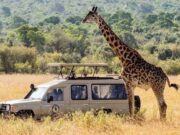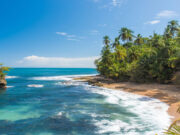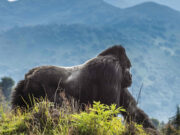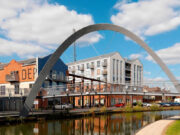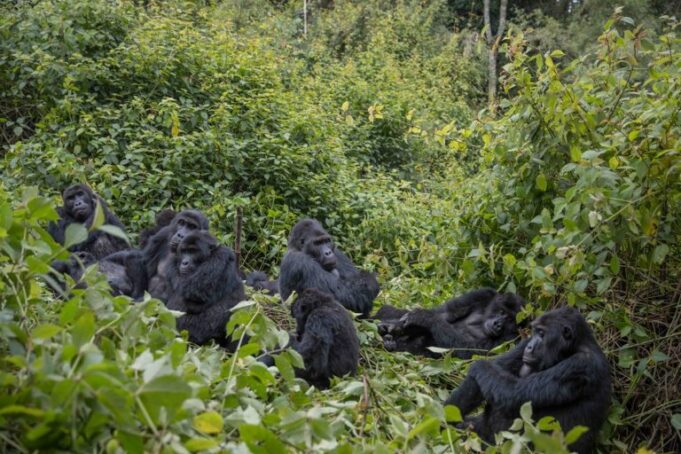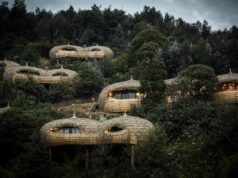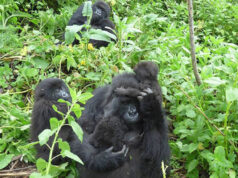In the Democratic Republic of Congo (DRC), the Kahuzi Biega National Park (KBNP) was created in order to protect the Eastern Lowland Gorillas (ELG), which is threatened by extinction. It has two sectors: the highland sector, which was originally created in 1970; and the lowland sector, where the park was extended in 1975. KBNP was the first national park to offer gorilla tourism in the early 1970s, but conflict and poverty in the region since then has led to encroachment of the park boundaries and a sharp decline in tourism.
The management of KBNP falls under the remit of ICCN (the Congolese Wildlife Service), which employs staff to protect the park, prevent poaching and support tourism. These staff work hard, but they are only a small force tasked with protecting an enormous area, making conservation work difficult. Communities around the area are heavily reliant on the KBNP for their livelihoods; collecting firewood, building materials, mineral extractions and bush meat from within the park. The men and women – both young and old – that engaged in these activities were often arrested and put in the park’s jail and forced to pay fines. This was in spite of the high levels of poverty among communities involved in these activities.
John Kahekwa Munihuzi born from the community in the highland sector of the KBNP was one of these rangers employed by ICCN as a teenager in the early 1980s to protect the park and learn more about the gorillas to habituate them for tourism. Tracking the gorillas each day, he was able to develop identification methods for 155 gorillas living in 6 groups, as well as the changing human pressures on the park; these pressures were at their most intense in the war years between 1996 and 2003. During this period, half the populations of gorillas in KBNP were killed for bush meat, trophies and selling live babies, as well as the entire elephant population in the park was killed. Before the war, and since its end, pressures reduced slightly, but many still remain, driven by the poverty of the surrounding communities and their resentment due to their sense of exclusion from the park.
John Kahekwa was shocked by these conflicts between the park and surrounding communities and wanted to better understand why they were happening. He interviewed more than 450 people from surrounding communities and kept hearing the same reply, “Empty stomachs have no ears, the KBNP is not for us, but rather belongs to the wardens, rangers and overseas organizations. We are poor and jobless and have no other way to live without entering the park, our former homeland”. John asked these people whether giving those jobs would fill their stomachs and open their ears to protecting the park; the answer was a universal “YES”.
John was determined to help these communities. In 1986, he used the tips he was given by tourists he had taken to visit gorillas, and bought t-shirt souvenirs to sell to tourists. This business worked well, and he was able to generate more revenue from a small part he acted in the film Gorillas in the Mist, BBC and ABC Sport documentaries and afterwards delivering lectures about KBNP’s gorillas. He managed to save USD $6,000, and – in partnership with fellow ranger colleagues and members of the local community – founded the Pole Pole Foundation (POPOF) in 1992. The vision of the foundation was to use an inclusive model to work for conservation and sustainable development of KBNP and the surrounding communities.
POPOF was welcomed by communities and set about researching where the main human pressures were placed on the park. Almost a 90% of people are living in poverty and dependent on resources from within the park for their survival. Also a 75% rate of illiteracy, and that the park totally lacked buffer zones between communities’ farmland and the park boundaries. To address this, POPOF delivered environmental education programmes, economic development schemes and tree planting activities.
The foundation has continued to expand its reach since its inception more than two decades ago, and now delivers projects within six key themes:
1) The contribution to the habituation of new gorilla groups in the park and the gorilla members’ identification for the tourism.
2) Tree planting schemes, which have led to the planting of over 4 million trees in four groupings surrounding the park, engaged women in tree planting through its “women to face climate change” programme, and created a multiple use buffer zone between communities and the park. When trees often mature, they are sold for building materials and charcoal to provide income for families. Since the creation of this scheme, illegal deforestation has been reduced in areas POPOF acts.
3) Livestock programmes to reduce bush meat hunting. The foundation distributed pigs, goats and guinea pigs to families; families used these animals for meat and also sold livestock offspring to create an income. Bush meat poaching in the park declined as a result of these programmes.
4) POPOF has also worked with an often neglected group, the Twa pygmies. The foundation provided sewing machines and trained Twa women to make clothes and ranger uniforms. They were the first foundation to create a development project for Twa women although a fund was limited to maintain the project.
5) POPOF has also trained ex-poachers in wood-carving. Men and women involved in the scheme carve gorillas in different poses and some carvings are sold as souvenirs in the visitors centre at Tshivanga the KBNP’s headquarters.
6) POPOF has launched an education programme to inspire a young generation to better understand the importance and value of the park and work to protect it. They created the Anga-POPOF-Miti education programme, which is formed of three schools; a kindergarten, elementary and secondary school. Students in the school undertake the conventional DRC syllabus and in addition carry out tree-nursery training and seedling distribution. The school has graduated many students, some of whom – if their families have the means – have progressed to university.
7) After winning the 2013 Whitley Fund for Nature Award, POPOF is now expanding its programmes into Itebero the lowland sector of the park, responding to the needs of communities there for fish pools to provide livelihoods and reduce poaching.
A day of harvesting fish from pools in Itebero-KBNP’s lowland sector in order to fight against poverty and bush meat consuming by POPOF.
POPOF has addressed many of the threats to the park, but other threats remain, and the foundation does not have the necessary funding required to implement all the projects that are required to address these threats. ICCN and International Conservation NGOs are working to address many of the threats facing the park and are running some very effective programmes in some areas; however, large human pressures continue to afflict the park each year. For example, the eco-corridor between the highland and lowland sections is particularly affected, with 95% of the area settled by rich farmers. A significant weakness of these projects is a lack of trust by local communities. ICCN has authority over the park, but lacks authority over surrounding communities. International Conservation NGOs bring large budgets to fund projects, but local communities do not trust them in the same way as they do local Conservation NGOs, and these international Conservation NGOs rarely work with local conservation organisations to implement their projects.
We all have a duty to protect the KBNP as a world heritage site and other protected areas of DRC, as well as the communities surrounding those. The only way we will achieve this is by increasing collaboration between organisations. We must form partnerships between ICCN, international Conservation NGOs, local Conservation NGOs and communities. Together, we can fight the poverty surrounding the park and in the process protect KBNP and other areas protecting the sub specie of the Grauer gorillas known as “the forgotten gorillas”, the flora and fauna within. This is the best, and indeed the only, way to protect the most wonderful World Heritage Sites of the Democratic Republic of Congo.
To know more about conflicts between Park managers/communities around and resolutions. Please email to:
popofgrauer@gmail.com
kahekwajohn@yahoo.fr
or call:
+243 9 98 89 95 98.
Website: www.polepolefoundation.org



